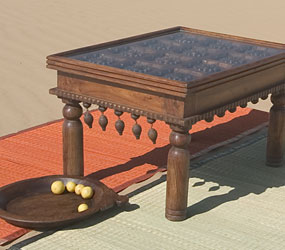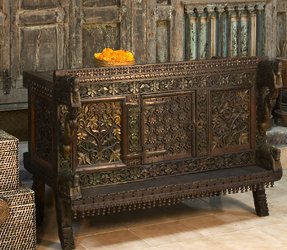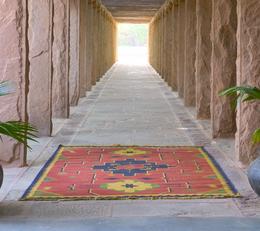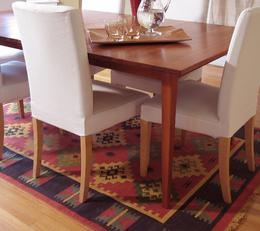Contribute
| Lokvani Talks To Sofia Bapna |
Nirmala Garimella
11/15/2005
Bunjara’s owner, Sofia Bapna knows that the passion for entrepreneurship that flows in her veins is what made her plunge into this business “It was a quick decision that took root when I visited We talked to Tell us about Bunjara ? Bunjara is an online store that specializes in antique, hand crafted furniture, hand-woven durries, rugs and gifts from Do you personally pick these pieces? Each one of them. I make 3 to 4 trips to Who are your clientele? How do you make contact with these people? My clients are from the Indian community, Interior designers, people who travel and want something different. People often buy native, handcrafted pieces because they love a place, are invested in that place, remember a treasured visit, or cherish a specific moment in their lives. Tell us more about the dhurries you sell? We get our dhurries from Rajasthan.None of them are factory laid. We are trying to create a market where the weavers can stay in the villages and earn an income instead of bringing them to cities where there is slum and scrawl. We custom design dhurries using natural dyes and unique patterns. Last year we also sponsored a traditional craftsman from India to demonstrate at the International Folk Art market in What are some of the interesting items that have been sold? There are many. Our best selling items are the sideboards, the Damchia. They are so different from what people see here. They are very dramatic, a conversational piece definitely. The sideboards are dotted with rectangular metal-framed mirrors in wooden carvings. For such large cabinets some of them have only one door but it is the look of the piece that is so attractive. We also have other unusual items that are eye catching. Other interesting items are the dowry chests that travelled from Andhra Pradesh to Burma. They are beautiful complex boxes with lots of compartments that nest in each other . It is competitive but we differentiate ourselves from the market. Every piece that we sell is one of a kind. Each product is unique and that person looking for one different thing is going to find it here. What most of my customers are looking for are pieces that have character, are dramatic and beautiful. It doesn’t matter that the piece is 100, 70 or 40 years old, it is the look that matters. How do you see the future of Bunjara ? It is a growing market. We do both wholesale and retail. We hope to improve the shopping experience online, expand to new products, move to softer stuff like cushions and quilts. I look forward to that. What should an entrepreneur keep in mind when starting a business? In my case, I made a quick decision. Sometimes when you think too hard you probably won’t do it. Secondly it has to be viable. Think of your co competencies and build on that. What does this need to absolutely succeed? If the most important role is not there then it will not take off. Also don’t go for perfection. Not that you should be sloppy but you have to draw the line between what is perfect and what is acceptable. When you are in a business you wear so many hats that you should be able to move from one to another rapidly. You are interacting with different people to do different things and you have to learn to delegate. The hard part is letting go. To me it had been an interesting experience. What the actual is nothing compared to the research, the theories etc. But in the end, you should not give up! To know more log on to www.bunjara.com
This is a very competitive market? How do you stay ahead of the curve?
You may also access this article through our web-site http://www.lokvani.com/
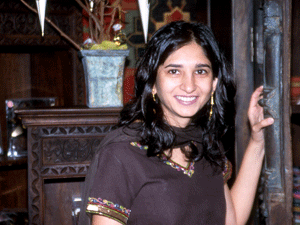
"Photo courtesy www.dongurewitzphotography.com"
